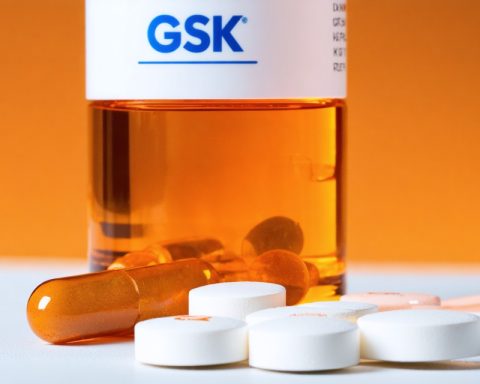- Biogen Inc. exemplifies the challenges and innovations in the changing pharmaceutical landscape, focusing on Alzheimer’s and multiple sclerosis.
- The pharmaceutical industry, valued at over $516 billion in 2022, is growing at 7.63% annually but faces high-risk investments, with only 14% of treatments receiving FDA approval.
- Artificial intelligence emerges as a key player, enhancing drug discovery and efficiency, reducing costs, and expediting the development process.
- The popularity of GLP-1 medications, such as Ozempic and Wegovy, is transforming perceptions around weight-loss treatments and showing potential for broader health benefits, including addiction reduction and Alzheimer’s treatment.
- Economic uncertainties have impacted funding and IPO opportunities, though the exploration of cell and gene therapies presents future advancements.
- The role of AI and new therapeutic avenues aims to reinvigorate innovation and investor confidence in the pharmaceutical sector.
Amid towering skyscrapers of the healthcare world, a shimmering beacon of innovation casts a hopeful light over an ailing pharmaceutical sector. Biogen Inc. stands as a testament to a fierce industry grappling with change. Known for its focus on debilitating ailments like Alzheimer’s and multiple sclerosis, Biogen’s struggle mirrors wider trends within the dynamic biopharma landscape.
A roaring river of innovation, inspired by trailblazing research, flows through the veins of a market once perceived as timid. The financial behemoth that is pharmaceutical manufacturing, valued at over $516 billion in 2022, promises robust growth and rockets forward at a rate of 7.63% annually. Yet, this venture is riddled with peril; only 14% of fledgling treatments find their wings in the FDA’s regulated sky, each costing a hefty billion-dollar price tag in a high-stakes game.
The dawn of artificial intelligence however, whispers promises of salvation. Algorithms capable of unraveling complex disease patterns unleash a realm of possibilities in drug discovery, optimizing costs and slashing process times with surgical precision. Meanwhile, the allure of weight-loss revolutions—cue Ozempic and Wegovy—captivate both consumers and large pharma alike. The life-altering potential of GLP-1 medications extends far beyond shedding pounds; they could, astonishingly, halve addiction rates and tentatively tackle Alzheimer’s specter.
Yet, the specter of uncertainty cloaks the industry. Economic clouds have dimmed funding, chilling the once-bustling IPO scene. Investors eye biotech enigmas with skepticism as new offerings emerge into an unpredictable world.
Nonetheless, opportunity beckons. Fertile fields ripe for exploration lie ahead as major pharmaceuticals cultivate cell and gene therapies to reap future rewards. As patents peel away like autumn leaves, fresh soil is readied for the seeds of the future. Amidst this pressure, could AI and new avenues rekindle the spark of discovery—and restore faith in pharma giants like Biogen? Only time shall tell.
Will AI and New Therapies Revive the Pharmaceutical Industry? Here’s What You Need to Know
How AI Transforms Pharma: Key Steps and Hacks
Steps in AI Drug Discovery:
1. Data Collection and Integration: Gather structured clinical and unstructured patient data.
2. Preprocessing: Clean the data and address missing values to ensure quality results.
3. Model Selection: Choose appropriate AI models like neural networks or natural language processing tools to analyze data.
4. Drug Target Identification: Use AI to predict interactions and effects on specific targets.
5. Candidate Screening: Rapidly test thousands of compounds for therapeutic efficacy.
6. Optimization and Validation: Refine drug candidates and validate results through clinical trials.
Life Hacks:
– Utilize Open Data: Access publicly available biomedical datasets to enhance your research groundwork.
– Leverage AI Platforms: Tools such as IBM Watson Health and Google DeepMind can accelerate initial steps.
Real-World Use Cases of AI in Pharma
– Deep Genomics: Uses AI to identify genetic drug targets.
– Atomwise: Utilizes AI to expedite small-molecule drug discovery.
– Exscientia: Deploys algorithms to design new molecules faster and more efficiently than traditional methods.
Market Forecasts & Trends
Industry Growth: By 2030, the pharmaceutical AI market is expected to grow at a CAGR of 33% due to increased adoption of AI in predictive analytics, precision medicine, and drug manufacturing.
Trends to Watch:
– Personalized Medicine: AI-driven biomarkers usher bespoke treatment plans.
– Decentralized Trials: AI facilitates remote monitoring and real-time data collection.
– Sustainability Initiatives: AI aids in reducing environmental footprints through optimized manufacturing processes.
Reviews & Comparisons
– AI vs Traditional Methods: AI reduces early-phase discovery time from several years to months.
– Cost Efficiency: Although initial AI implementation can be costly, long-term savings are significant.
– Accuracy: AI models are rapidly improving, though human oversight remains critical.
Controversies & Limitations
– Data Privacy: Handling sensitive health data with AI poses ethical challenges.
– Bias in Algorithms: Ensuring representative datasets to avoid biased outcomes is a major concern.
Security & Sustainability
Security: AI systems require robust cybersecurity frameworks to protect intellectual property and sensitive health data.
Sustainability: AI contributes to greener production processes, aligning with global sustainability goals by reducing waste and emissions.
Quick Tips to Harness AI in Pharma
– Stay Informed: Regularly follow industry news and updates to keep abreast of AI advancements.
– Engage with Conferences: Participate in biopharma events to network and gain insights from industry leaders.
– Leverage AI Tools: Experiment with available AI-enabled platforms to understand their capabilities and limitations.
For further exploration, consider checking resources at major pharmaceutical companies like Biogen and academic collaboration networks such as Drug.org.
Conclusion
AI’s burgeoning presence in pharmaceutical innovation promises significant breakthroughs yet presents notable challenges that require strategic navigation. By understanding the potential and pitfalls, stakeholders can make informed decisions, foster innovation, and restore faith in the sector’s future.








